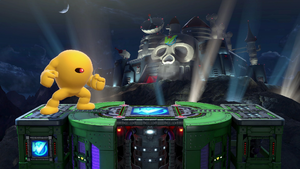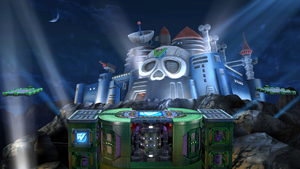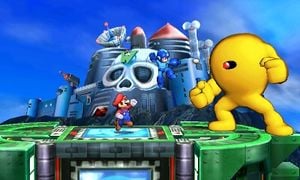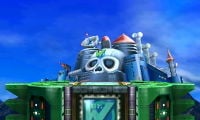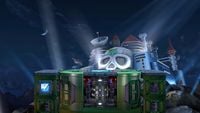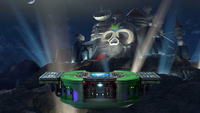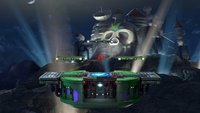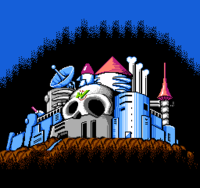Wily Castle
| Mega Man Wily Castle | |
|---|---|
 Wily Castle as it appears in Smash. | |
| Universe | Mega Man |
| Appears in | SSB4 Ultimate |
| Availability | Starter |
| Crate type | Futuristic |
| Maximum players | 4 (3DS and Wii U) 8 (Wii U Ω form, Ultimate) |
| “ | The base of Dr. Wily from Mega Man 2 can be seen in the background of this stage. At times a Yellow Devil will launch out from the castle and interfere with the battle. | ” |
| —Super Smash Bros. 4 Official Site | ||
| “ | Hazards from the previous games for both Nintendo 3DS and Wii U will appear on this stage. The Yellow Devil will cause a big explosion when it's defeated, but the player who landed the final attack doesn't take any damage. Use this to your advantage! | ” |
| —Super Smash Blog, Super Smash Bros. Ultimate Official Site | ||
Wily Castle (ワイリー基地, Wily Base), also known as Skull Castle, is a stage that appears in both versions of Super Smash Bros. 4 and Super Smash Bros. Ultimate from the Mega Man series. It takes place in front of Dr. Wily's Castle as depicted in Mega Man 2. The recurring Yellow Devil boss from the Mega Man games also appears on this stage as a stage hazard, exploding when enough damage is done to its eye by the players. Its main method of attacking is using his own body, similar to Mega Man. In Ultimate, Mega Man is fought here for his unlock battle.
Stage overview[edit]
The main body of the stage is a flat body which fighters cannot go underneath, similar to Yoshi's Story and Summit. There are two floating platforms at either side of the stage, suspended beyond the body of the stage. In Super Smash Bros. 4, depending on what version the game is, different platforms will appear with different functionally. On the Wii U version, rails similar to those in Guts Man's stage from the original Mega Man can appear around the platform, with a moving platform following as it does in that game. The rails can have breaks in them which, when the platform crosses them, cause it to drop temporarily until it reaches a solid rail again. There are several possible rail configurations. On the 3DS version, platforms will float downwards above the main stage and additional platforms can also appear to the left and right of the main stage, past its ledges; these include rail platforms with no breaks that move upwards, then downwards, with ledges that can be grabbed, as well as platforms that go back and forth along a pendulum-like path when landed on, similar to the ones from Bright Man's stage from Mega Man 4. Like Kalos Pokémon League, characters remaining on the ascending platforms will be Star KOed. In Ultimate, all platform types are included from both the 3DS and Wii U versions.
At times, parts of the Yellow Devil will ascend from the background, then descend and reassemble on the stage. The Yellow Devil acts as an obstacle and environmental hazard when formed, standing on either side of the stage (thus making it difficult to pass through him) while attacking players with a triple-shot from its single eye. After each laser barrage, it will disassemble and fling parts of its body to the other side of the stage, dealing damage to anyone it contacts with, before reassembling and repeating the process.
The Yellow Devil can be defeated by players if they deal a sufficient amount of damage to its only vulnerable spot, the eye. Once defeated, the Yellow Devil will create a slowly-expanding explosion that trap opponents, which does not affect the player who dealt the killing blow. The final hit deals significant damage and knockback, and the explosion counts as an attack for the player who landed the final blow. If left undefeated, the Yellow Devil will disassemble and fly off to the left or right before disappearing.
In the 3DS version, the stage takes place at daytime; in the Wii U version and Ultimate, it takes place at nighttime.
Ω forms and Battlefield form[edit]
In Super Smash Bros 4, the Ω form uses the same platform as the normal form for both games. The Yellow Devil and scrolling platforms are absent. In a notable difference to Final Destination and most Ω stages, the platform extends all the way down to the lower blast line, meaning it can be wall climbed up and can't be flown under.
In Super Smash Bros. Ultimate, the Ω form and Battlefield form are similar to SSB4's Ω form; however, the main platform is resized and reshaped to match Final Destination and Battlefield, respectively. The three soft platforms of the Battlefield form resemble the moving platforms of the normal form.
Hazards Off[edit]
With hazards off in Ultimate, the Yellow Devil does not appear, and neither do any of the unique platforms, leaving the stage a flat plane with walls stretching to the bottom blast line; this makes it similar in essence to the "plateau"-style Ω forms that appeared in SSB4 (such as, fittingly, Wily Castle), but with a much larger platform.
Wily Castle and the Yellow Devil stage boss are used in the rules section as the side picture for the Stage Hazards switch setting.
Origin[edit]
In every game in the original series of Mega Man games, Dr. Wily would reside in a castle that could only be accessed by defeating the eight (six in the first Mega Man game) Robot Masters. Among the numerous robotic enemies found in the castle besides the rebuilt Robot Masters, the most notable enemy was the recurring boss, Yellow Devil. This boss was often among the last lines of defense against Mega Man, being fought at the end of certain stages in the castle. As for the castles themselves, there were often several different stages in them, one of which was usually reserved for fighting the rebuilt Robot Masters in a sort of Boss Rush Mode. At the end of the castle, Dr. Wily was the players' opponent, often fighting in countless varieties of mechs.
The version of Dr. Wily's Castle that appears in this stage is the one from Mega Man 2. Additionally, the "Dr. W" logos that appear on the floor and front of the stage originate in Mega Man 2 where they appear above the door leading to the hallway before a Robot Master battle. They appear in most other games in the series, though notably Mega Man 9 replaces it with a "Dr. L" logo, as Dr. Light is framed for the events of the game.
Depending on the version being played, different platforms appear. In the Wii U version, a rail carrying a moving platform appears. These rails have been a staple of the Mega Man series since the first game, where they appeared in Guts Man's stage and Dr. Wily's Castle. In the 3DS version, pendulum-like platforms similar to the ones in Bright Man's stage, and the rotating conveyor belt platforms in the Tako Trash boss room from Mega Man 4 appear, in addition to floating platforms modeled after the ones in Tomahawk Man's stage from Mega Man 6. In Ultimate, the two versions are combined into one.
Tournament legality[edit]
While the Ω form of this stage is allowed, the standard stage is banned in tournaments due to the Yellow Devil commonly disrupting the match with its attacks and death explosion.
Even with the option to turn off hazards in Ultimate, the stage is almost always banned due to it being extremely similar to Final Destination.
Update history[edit]
- Wily Castle's on-screen appearances locations have been changed.
Gallery[edit]
Super Smash Bros. for Nintendo 3DS[edit]
Wily Castle in Super Smash Bros. for Nintendo 3DS.
Super Smash Bros. for Wii U[edit]
Wily Castle in Super Smash Bros. for Wii U.
Kirby with the Yellow Devil on this stage.
Super Smash Bros. Ultimate[edit]
Names in other languages[edit]
Trivia[edit]
- This stage and Gaur Plain have several similarities:
- They are both non-Smash based stages which are shared between both versions of Super Smash Bros. 4.
- They have appeared on both home consoles and handhelds (Wii and New Nintendo 3DS for Xenoblade Chronicles; NES and Game Boy for Mega Man 2 and Mega Man II, respectively, although the castle in II is a different design).
- The handheld version of Xenoblade Chronicles was released after Smash 4, though it was announced prior to Smash 3DS's release.
- They are the only two shared stages to have gameplay differences between the 3DS version and the Wii U version.
- The Yellow Devil actually originates from the first Mega Man, and makes no appearance of any kind in Mega Man 2, despite the stage being primarily based on Mega Man 2.
- Pausing Training Mode while the Yellow Devil is exploding will result in the explosion and the Yellow Devil's actual disappearance being desynched.
- In Ultimate, Nightmare and Nikki cannot be summoned by Assist Trophy on this stage, the latter due to the dark background obscuring her drawings.
|
| |
|---|---|
| Fighter | Mega Man (SSB4 · SSBU) |
| Assist Trophies | Elec Man · Wily Capsule · Zero |
| Stage | Wily Castle |
| Enemy | Mettaur |
| Other | Bass · Energy Tank · MegaMan.EXE · MegaMan Volnutt · Proto Man · Star Force Mega Man · X · Yellow Devil |
| Trophies and Spirits | Trophies · Spirits |
| Music | SSB4 · Ultimate |
| Masterpiece | Mega Man 2 |
